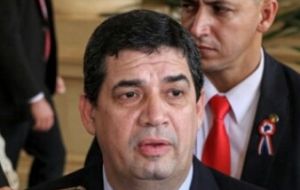MercoPress. South Atlantic News Agency
Paraguayan VP claims only half truths became known about obscure Itaipu deal
 “The truth will be known when Ferreira and I are sitting facing each other,” said Velázquez.
“The truth will be known when Ferreira and I are sitting facing each other,” said Velázquez. Paraguay's Vicepresident Hugo Velázquez said that so far only half truths regarding the somber deal with Brazil about the sale of electricity are known to the public. The affair has left the government of President Mario Abdo on the brink of collapse despite having dodged impeachment before the Senate this past week.
“There are many things that were said with half truths. Only the engineer Pedro Ferreira and I can give the truth to the Paraguayan people,” said Velázquez in an interview.
Velázquez insisted the only mistake made by the lawyer José Rodríguez, who is presumed to have brokered the agreement in the name of the vicepresident, was “to have mentioned me.” Velázquez added Rodríguez “is not an official of the Vicepresidency; he was wrong and he has acknowledged it.”
On May 24, Brazil and Paraguay signed a deal inconsustent with what Itaipu's only two customers, Paraguay's National Electricity Administration (ANDE) and Brazil's Eletrobras had been arranging on a yearly basis - how much energy would each purchase.
The process grew more complicated in recent years because Itaipu generates surplus energy that is not included in its official estimate and, therefore, is sold at a sizeably lower price. Since ANDE is the only one that can decide how much of the guaranteed power it will acquire (the rest going to Eletrobras), it can also speculate on using more of the cheaper surplus energy as provided for in recent agreements in cases of unforeseen demand spikes.
But this time around Eletrobras' technical team demanded that ANDE increased the amount of guaranteed power acquired in accordance with the increase in its local demand, while the Paraguayan company sticked to the amount purchased each of the previous three years and eventually cope with a greater demand by resorting to the cheaper surplus energy.
This controversy prevented the ANDE and Eletrobras technical teams for the first time to agree on how much power each company would purchase and it all became a diplomatic issue.
The May 24 treaty - from which the ANDE experts were cast aside - forced the company to up the acquisition of guaranteed power by 6% per year, for the next three years, a rate that was still below the increase in demand, which meant that Paraguay would continue to use the cheaper energy although at a higher overall cost.
In any case, it was viewed by many as an international arrangement behind the Paraguayan Parliament's back. Some lawmakers tried to have both Abdo and Velázquez impeached. The drive was unsuccessful at Congress level but some political groupings have taken it to the streets.
In addition, the Brazilian company Leros sought to buy energy from ANDE without competing in a tender as per a proposed clause 6 in that arrangement. Velázquez, who allegedly negotiated through Rodríguez for that clause to be added, explained Sunday that the only person who can know the truth was then Paraguay's Ambassador to Brasilia Hugo Saguier Caballero, one of the officials whose head fell in the scandal.
In Velázquez' version, the controversial Clause 6 was actually a proposal by ANDE chief Pedro Ferreira, who allegedly sent a note to Leros for the purchase of energy. But Ferreira has claimed he resigned in disagreement with what had been agreed upon and his resignation was exactly how and why the case became notorious together with Article 6, which ANDE intended to put into the agreement and which was not finally included. This is an article that would have authorised ANDE to sell in the Brazilian market up to a certain amount of the energy acquired from Itaipú. It is very naive to suppose that Brazil would have accepted to put in an public document such a clausean, which de facto modifies its historical interpretation of the treaty, according to which each partner can only buy the energy to be sold domestically.
Rodríguez reportedly sought to buy energy from ANDE on behalf of Leros and sell it to the Brazilian market.
Ferreira claimed Rodríguez was introduced to him by Velázquez himself as his legal advisor and the lawyer maintained he was authorised to handle all negotiations because the Leros company belongs to the very family of Brazilian President Jair Bolsonaro. Rodriguez also revealed that he had privileged information when he asked that the article - which was being negotiated at the highest diplomatic level - not be included in the minutes - to prevent the operation from being made public.
”Velázquez insisted he had asked Rodríguez to tell the whole truth, which he believed had already occurred in the lawyer's testimony to the courts snd announced he would press no charges gainst him for posing as an adviser.
The vicepresident again called for a public debate with Ferreira, better if at a neutral venue. “The truth will be known when Ferreira and I are sitting facing each other,” he said.




Top Comments
Disclaimer & comment rulesCommenting for this story is now closed.
If you have a Facebook account, become a fan and comment on our Facebook Page!